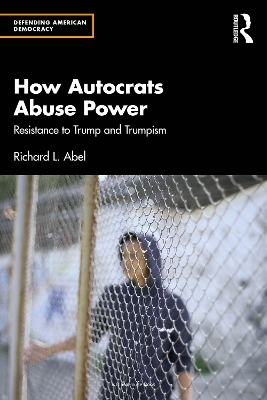
How Autocrats Abuse Power
Resistance to Trump and Trumpism
Seiten
2023
Routledge (Verlag)
978-1-032-62881-3 (ISBN)
Routledge (Verlag)
978-1-032-62881-3 (ISBN)
Chronicling and analyzing resistance to the threat that autocracy poses to American liberal democracy, this book provides the definitive account of both Trump’s efforts to erode democracy’s essential elements and opposition to those efforts.
This book is about the threat of autocracy, which antedated Donald Trump and will persist after he leaves the stage. Autocrats blur or breach the separation of powers, use executive orders to bypass the legislature, pack the courts, replace career prosecutors with political appointees, abuse the pardon power, and claim immunity from the law. They seek to hobble opposition from civil society by curtailing speech and assembly, tolerating and even encouraging vigilante violence, and attacking the media. As this book demonstrates, Trump followed the autocrat’s playbook in many ways. He was a huckster of hate, aiming his vitriol at women and racial minorities and making attacks on immigrants the focus of his 2016 campaign, as well as his first years in office. Nevertheless, his rhetoric and policies encountered widespread opposition—from religious leaders, business executives, lawyers and bar associations, and civil servants. His executive orders (on which he relied) were almost all struck down by courts: including the first two “Muslim bans,” the detention of children and their separation from parents, the diversion of military funds to build the border wall, the insertion of a citizenship question in the census, and the limits on asylum. Just as Trump sought to weaponize the criminal justice system against his political opponents, so he manipulated it to defend his cronies, derailing some of their prosecutions. Trump also intervened in courts martial and criminal prosecutions of those convicted of war crimes in Afghanistan and Iraq and those accused of desertion and terrorism. Again, however, there was resistance, as some career prosecutors withdrew from cases or resigned when subjected to political pressure and federal courts convicted all of Trump’s allies—even though the president went on to use his unreviewable pardon power. This book, then, documents the abuses that are characteristic of autocracy and assesses the various forms of resistance to them.
This definitive account and analysis of Trumpism in action, as well as the resistance to it, will appeal to scholars, students, and others with interests in politics, populism, and the rule of law and, more specifically, to those concerned with resisting the threat that autocracy poses to liberal democracy.
This book is about the threat of autocracy, which antedated Donald Trump and will persist after he leaves the stage. Autocrats blur or breach the separation of powers, use executive orders to bypass the legislature, pack the courts, replace career prosecutors with political appointees, abuse the pardon power, and claim immunity from the law. They seek to hobble opposition from civil society by curtailing speech and assembly, tolerating and even encouraging vigilante violence, and attacking the media. As this book demonstrates, Trump followed the autocrat’s playbook in many ways. He was a huckster of hate, aiming his vitriol at women and racial minorities and making attacks on immigrants the focus of his 2016 campaign, as well as his first years in office. Nevertheless, his rhetoric and policies encountered widespread opposition—from religious leaders, business executives, lawyers and bar associations, and civil servants. His executive orders (on which he relied) were almost all struck down by courts: including the first two “Muslim bans,” the detention of children and their separation from parents, the diversion of military funds to build the border wall, the insertion of a citizenship question in the census, and the limits on asylum. Just as Trump sought to weaponize the criminal justice system against his political opponents, so he manipulated it to defend his cronies, derailing some of their prosecutions. Trump also intervened in courts martial and criminal prosecutions of those convicted of war crimes in Afghanistan and Iraq and those accused of desertion and terrorism. Again, however, there was resistance, as some career prosecutors withdrew from cases or resigned when subjected to political pressure and federal courts convicted all of Trump’s allies—even though the president went on to use his unreviewable pardon power. This book, then, documents the abuses that are characteristic of autocracy and assesses the various forms of resistance to them.
This definitive account and analysis of Trumpism in action, as well as the resistance to it, will appeal to scholars, students, and others with interests in politics, populism, and the rule of law and, more specifically, to those concerned with resisting the threat that autocracy poses to liberal democracy.
Richard L. Abel is Michael J. Connell Distinguished Professor of Law Emeritus and Distinguished Research Professor, UCLA, USA.
Preface vii
Acronyms x
Dramatis Personae xii
1 How Autocrats Use Power 1
2 The Politics of Resentment 8
3 Politicizing Criminal Justice 74
4 The Fate of Law 151
References 174
Index 181
| Erscheinungsdatum | 03.01.2024 |
|---|---|
| Reihe/Serie | Defending American Democracy |
| Zusatzinfo | 4 Tables, black and white |
| Verlagsort | London |
| Sprache | englisch |
| Maße | 156 x 234 mm |
| Gewicht | 640 g |
| Themenwelt | Recht / Steuern ► Allgemeines / Lexika |
| Recht / Steuern ► Arbeits- / Sozialrecht ► Sozialrecht | |
| Recht / Steuern ► EU / Internationales Recht | |
| ISBN-10 | 1-032-62881-2 / 1032628812 |
| ISBN-13 | 978-1-032-62881-3 / 9781032628813 |
| Zustand | Neuware |
| Informationen gemäß Produktsicherheitsverordnung (GPSR) | |
| Haben Sie eine Frage zum Produkt? |
Mehr entdecken
aus dem Bereich
aus dem Bereich
Textausgabe mit ausführlichem Sachverzeichnis
Buch | Softcover (2024)
dtv Verlagsgesellschaft
CHF 29,25
meine Rechte: Wohnen, Arbeiten, Steuern, Mobilität
Buch | Softcover (2024)
C.H.Beck (Verlag)
CHF 16,65


